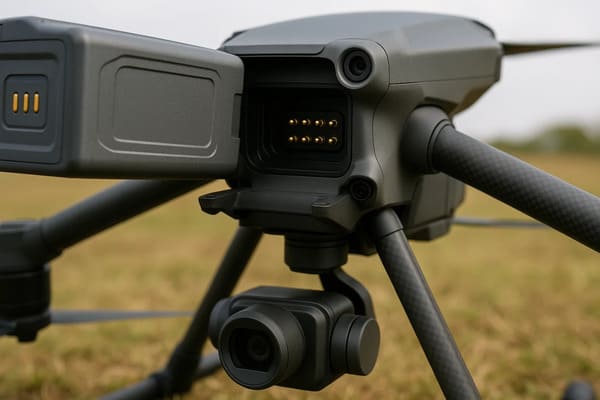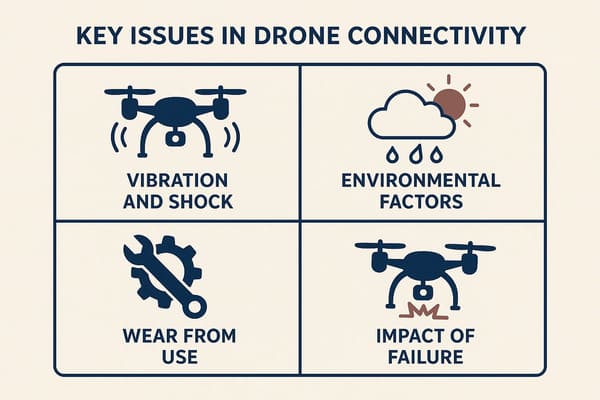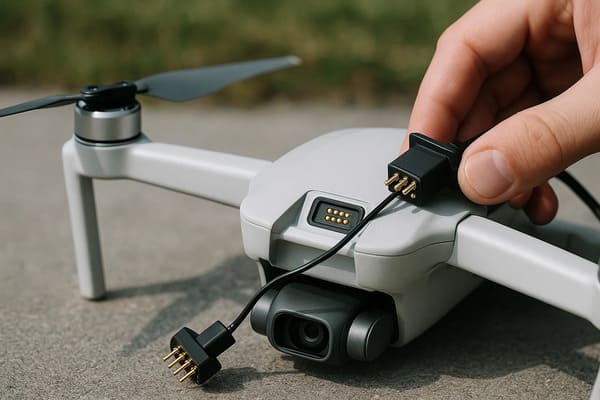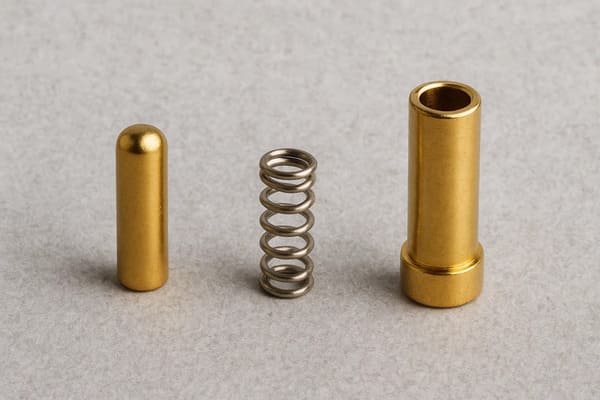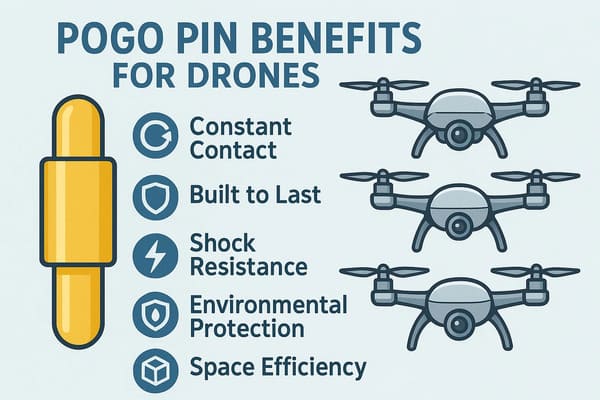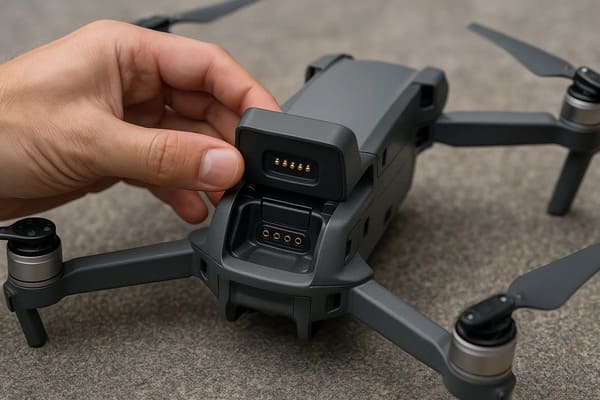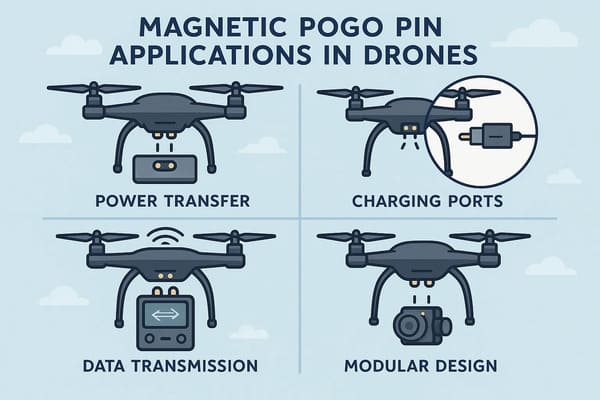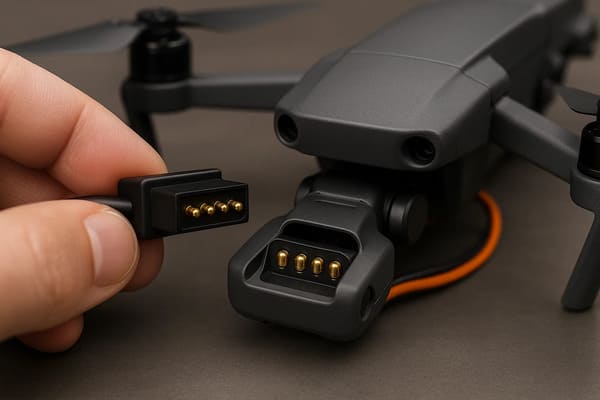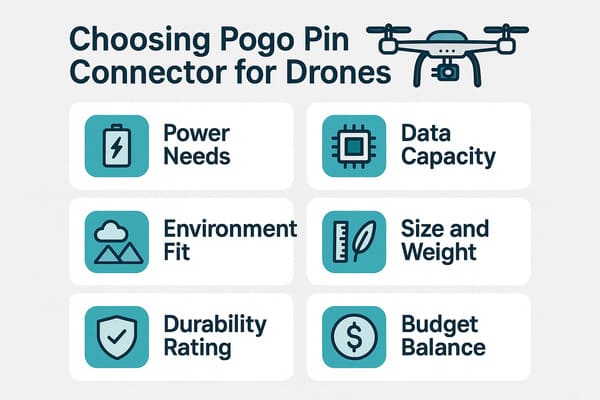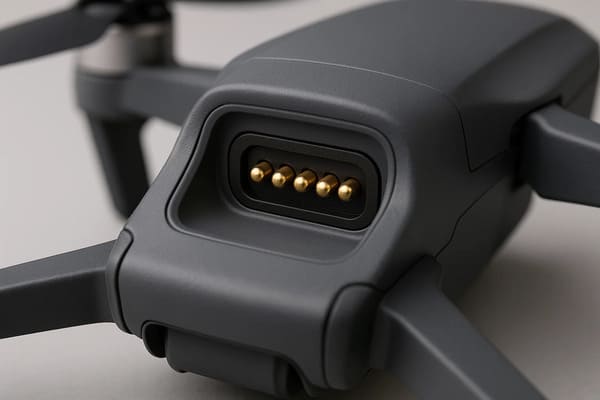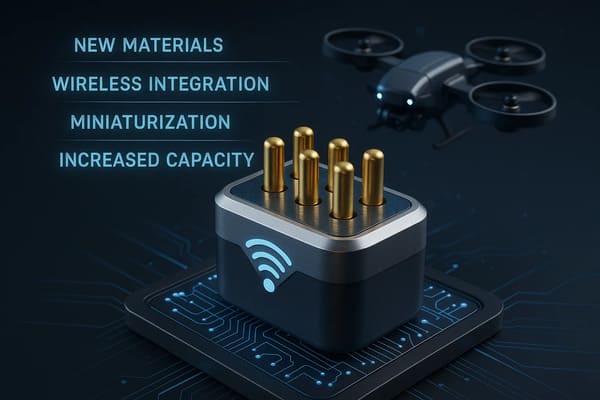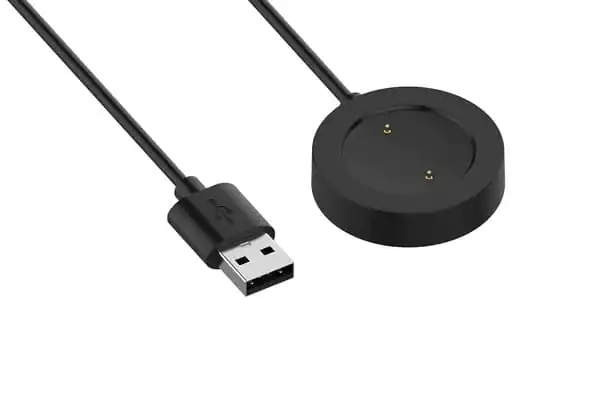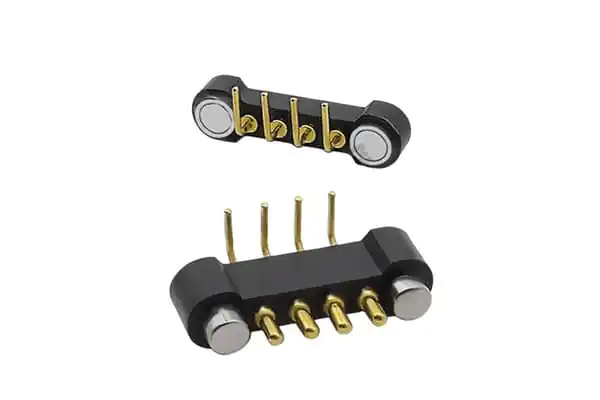Have you ever worried about a drone failing mid-flight due to a bad connection?
I know I have, especially when a shaky power or data link can mean a costly crash.
This frustration drives me to explore better solutions like pogo pin connectors for reliable drone performance.
Pogo pin connectors ensure reliable power and data in drones through their robust design.
Their spring-loaded mechanism, consisting of a plunger, barrel, and spring, maintains consistent contact despite vibrations and shocks.
This design supports numerous mating cycles and resists environmental elements like dust and moisture, vital for stable drone operation.
Now, let’s look closer at the challenges drones face and how these innovative spring-loaded pin connectors solve them.
Stick with me to uncover practical solutions for better drone reliability.
Why Do Drones Suffer from Unreliable Connections?
Have you ever seen a drone stutter or crash due to a loose connection?
I’ve witnessed it during a project, and it’s a nightmare for any operator.
The constant worry of failure pushes us to find better options.
Vibrations from flight shake traditional connectors loose, breaking contact.
Shock during landings adds stress, while dust and moisture seep into exposed ports, causing shorts.
temperature fluctuations affecting materials, and wear from frequent use.
These disrupt power and data flow, compromising safety and mission success.
Robust solutions like pogo pin connectors mitigate these issues effectively.
Let’s explore these pain points further.
I’ll break down the core issues and show why they matter to every drone user.
Stay with me as we tackle each problem.
Understanding these challenges is the first step to finding lasting solutions for your drone needs.
Key Issues with Drone Connectivity
- Vibration and Shock: Drones are always moving, and this shakes up standard connectors.
The constant motion loosens contact points, leading to power or data loss.
I’ve seen missions fail because a connector couldn’t handle the buzz of flight. - Environmental Factors: Dust clogs ports, moisture causes corrosion, and temperature swings weaken materials.
A friend’s drone once failed during a rainy shoot due to water damage in the connector.
These elements are tough on any device. - Wear from Use: Traditional connectors aren’t built for frequent plugging and unplugging.
They wear down after a few hundred cycles, unlike a durable pogo pin connector.
This quick degradation means more replacements and downtime. - Impact of Failure: A bad connection can cut power to motors or disrupt data from sensors.
This risks crashes, lost footage, or failed deliveries.
For B2B clients, this translates to financial loss and damaged trust.
Here’s a quick look at how traditional connectors struggle compared to modern needs in drones:
| Challenge | Traditional Connectors | Impact on Drones |
|---|---|---|
| Vibration and Shock | Loosen easily under movement | Power/data loss mid-flight |
| Dust and Moisture | Prone to clogging and corrosion | Short circuits or failure |
| Temperature Fluctuations | Material degrades with changes | Unstable performance |
| Mating Cycles | Wear out after limited use | Frequent replacement needed |
Drone connectivity issues demand robust solutions.
As a reliable pogo pin manufacturer, we design precision spring-loaded pins specifically engineered for the unique challenges of UAVs.
Our pins ensure stable connections, enhanced safety, and ultimately, greater mission success for your drone applications.
What Makes Pogo Pin Connectors a Robust Solution for Drones?
Ever wondered why some drones keep running smoothly while others fail?
I’ve had my share of connection headaches until I discovered pogo pin connectors.
Their design changed how I approach drone reliability.
Pogo pin connectors provide a robust solution for drones through their unique design.
These spring-loaded pins maintain consistent electrical contact, absorbing shock and resisting vibration.
They also withstand wear over thousands of cycles and offer protection against dust and moisture.
Their compact size makes them ideal for stable power and data transfer in drone systems.
I’m excited to show you how they solve common drone issues.
Let’s look at their key benefits and why they matter.
Read on to see how a trusted spring loaded pin supplier can provide these advantages.
You’ll find practical ways to boost your drone’s performance.
Benefits of Spring Loaded Pin Connectors in Drone Design
- Constant Contact: The spring inside a pogo pin connector pushes the pin to maintain touch, even when a drone shakes.
This cuts the risk of power or data loss. I once had a drone keep filming during rough winds thanks to this. - Built to Last: These pins handle thousands of connections without wearing out.
A high-quality magnetic pogo pin connector can endure over 10,000 cycles, far outlasting standard options.
This means less maintenance for your fleet. - Shock Resistance: Their design absorbs vibration and impact.
During a test flight with heavy payloads, my drone landed hard, but the connector held strong.
This is vital for industrial drone use. - Environmental Protection: Many pins come with sealing for dust and water resistance.
They can be used in humid areas without a single short circuit, proving their value in harsh settings. - Space Efficiency: Their small size fits tight drone designs.
This helps engineers pack more technology into limited space without sacrificing reliability.
Here’s a clear comparison of how pogo pin connectors outperform traditional ones for drone applications:
| Feature | Pogo Pin Connector | Traditional Connector |
|---|---|---|
| Vibration Resistance | Maintains contact under stress | Loosens with movement |
| Durability | Handles 10,000+ cycles | Wears out after few hundred |
| Environmental Protection | Sealed against dust/moisture | Easily damaged by elements |
| Size | Compact, space-saving | Bulkier, less flexible |
Pogo pin connectors offer clear advantages for drone designs.
They address critical issues like vibration, durability, and environmental protection.
Choosing suitable connectors enhances drone performance and longevity.
These benefits help ensure reliable operations for various applications.
How Are Pogo Pin Connectors Applied in Drone Systems?
Ever thought about what keeps a drone’s power and data flowing seamlessly?
I’ve been amazed by how pogo pin connectors fit into every part of a drone.
Their versatility makes them a go-to for many applications.
Pogo pin connectors are applied in drone systems in several key areas.
They connect batteries to power boards, ensuring a steady energy supply.
They link charging ports and docking stations for efficient recharging.
Furthermore, they support data transfer for components like cameras and sensors, facilitating clear communication and enabling modular designs for easy component swaps.
Let’s break down these uses. I’ll show you how they enhance drone operations for B2B needs.
Keep reading to see how these connectors transform drone functionality.
You’ll gain ideas for your own projects or business applications.
Specific Roles of Magnetic Pogo Pin Connectors
- Power Delivery: A magnetic pogo pin connector links batteries to power boards, ensuring stable energy flow.
I’ve used them to keep drones running for long missions without hiccups.
They also simplify charging through docking stations. - Data Links: They connect cameras and sensors to flight controllers for real-time data.
During a survey project, these pins kept high-definition feeds uninterrupted, proving their reliability for critical tasks. - Modular Setup: They allow quick swaps of components like gimbals or other payloads.
Thanks to this feature from an innovative pogo pin supplier, a client once upgraded their drone fleet in hours, saving time and money. - Repair Ease: Their design supports fast fixes by making parts accessible. I’ve replaced damaged modules on-site without specialized tools, a huge plus for field operations in industrial automation.
Here’s a table showing key applications and benefits for drone systems using these connectors:
| Application | Role of Pogo Pin | Benefit for Drones |
|---|---|---|
| Power Transfer | Links battery to board | Stable energy, no interruptions |
| Charging Ports | Connects to docking stations | Quick, secure recharging |
| Data Transmission | Supports sensors and cameras | Clear, real-time data flow |
| Modular Design | Enables easy component swaps | Faster upgrades and repairs |
Pogo pin connectors are integral to advanced drone systems.
They provide secure power and data connections, enabling reliable operation.
Their versatile design supports modularity and simplifies maintenance.
These characteristics are crucial for efficient and adaptable drone applications.
How to Choose the Right Pogo Pin Connector for Drone Needs?
Picking the perfect spring-loaded pin connector for a drone can feel tricky, right?
I’ve faced this choice many times, stressing over whether it’ll handle the job.
A wrong pick can derail an entire project.
To choose the right pogo pin connector for drones, match current and voltage ratings to power needs, considering options from 1A to 15A.
Evaluate data speed for high-bandwidth requirements.
Select IP-rated connectors for environmental protection.
Balance size and weight with design constraints.
Assess mating cycles for durability, and consider cost against performance.
I’ll guide you through the key factors to consider.
Let’s make this decision simple and effective.
Essential Factors for Selecting Spring Loaded Pin Connectors
- Power Needs: Always verify your drone’s current and voltage requirements.
For instance, robust pogo pin connectors can manage up to 15A for more demanding drone models.
Selecting the correct rating prevents power interruptions during flight. - Data Capacity: Confirm that the connector supports high-speed data transmission essential for cameras or sensors.
Checking the bandwidth specifications ensures a smooth and uninterrupted data flow for critical operations. - Environment Fit: For challenging conditions, choose connectors with an appropriate IP rating to resist dust and water.
These features are vital for maintaining performance in harsh outdoor environments. - Size and Weight: Drones benefit from components that are both compact and lightweight.
A well-chosen pogo pin connector optimizes space and power delivery, contributing to an efficient drone design. - Durability Rating: Examine the mating cycles, as some connectors are designed to withstand 10,000 or more cycles. This metric is crucial for applications involving frequent connections, extending the lifespan of drone components.
- Budget Balance: While high-performance connectors may have a higher initial cost, they often provide superior results and long-term reliability.
Investing in quality components can prevent future issues and ultimately prove more cost-effective.
Here’s a quick guide to balance these factors when sourcing connectors:
| Factor | Key Question | Why It Matters |
|---|---|---|
| Current/Voltage | Does it match power needs? | Prevents power failure |
| Data Speed | Can it handle high bandwidth? | Ensures clear data transmission |
| IP Rating | Is it suited for harsh settings? | Protects against elements |
| Size/Weight | Does it fit drone design? | Maintains flight efficiency |
| Mating Cycles | How long will it last? | Reduces replacement costs |
| Cost | Is performance worth the price? | Impacts budget and quality |
Selecting the appropriate pogo pin connector is crucial for drone performance.
By carefully assessing power needs, data capacity, environmental fit, size, durability, and cost, you can ensure reliable and efficient drone operations.
This thoughtful approach supports successful and long-lasting applications.
What Are the Future Trends in Pogo Pin Technology for Drones?
Are you curious about what’s next for drone connectivity?
I often think about how fast tech evolves, and pogo pin connectors are no exception.
Staying ahead means knowing these trends.
Future pogo pin technology for drones includes enhanced durability and current capacity through new materials.
Hybrid systems may emerge with wireless charging integration, offering greater flexibility.
Miniaturization will lead to smaller, high-density connectors, ideal for advanced compact drone designs.
These trends aim to improve performance and expand design possibilities for future drone applications.
Let’s take a closer look at these developments. I’ll share why they’re exciting for drone innovation.
Keep reading to see how these trends can shape your business.
You’ll find ideas to stay competitive in a fast-moving field.
Emerging Advances in Magnetic Pogo Pin Technology
- Stronger Materials: New alloys and coatings are increasing durability and current limits.
A high-quality magnetic pogo pin connector can now handle harsher conditions and higher power needs.
This is huge for industrial drone tasks. - Wireless Hybrid Systems: Combining pogo pins with wireless charging tech offers dual options.
Imagine docking a drone for a quick wired charge or using wireless for convenience.
I see this as a game-changer for fleet management. - Smaller Designs: Miniaturization means more pins in less space without losing performance. As a state-of-the-art pogo pin manufacturer, I’ve noted how this fits micro-drones in IoT or consumer markets. It’s about packing power into tiny frames.
- Enhanced Capacity: Future pins will carry more data and power at once. This supports advanced sensors or 4K cameras on drones. I’ve discussed this with engineers, and the potential for complex missions grows with it.
Here’s a snapshot of how these trends improve drone connector tech:
| Trend | Advancement | Benefit for Drones |
|---|---|---|
| New Materials | Higher durability, current capacity | Longer life, tougher missions |
| Wireless Integration | Hybrid charging options | Flexible power solutions |
| Miniaturization | Smaller, high-density pins | Fits compact, advanced designs |
| Increased Capacity | More data/power per pin | Supports complex systems |
These advancements in pogo pin technology promise significant improvements for drones.
From enhanced durability to smaller designs and increased capacity, these developments will empower more robust and versatile drone applications.
Staying informed about these trends is key for future innovation.
Conclusion and Call to Action
I hope this guide on pogo pin connectors for drones has been useful.
Their reliability, durability, and compact design make them vital for power and data needs.
For premium solutions, check out our homepage or reach out via our contact page.
I’m Steven, ready to help with innovative connector options.

